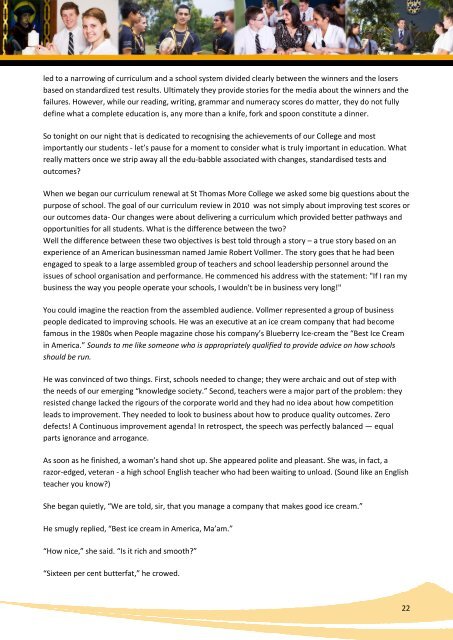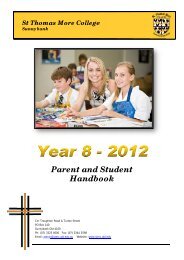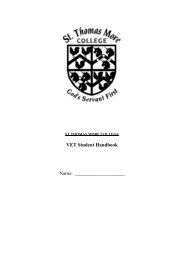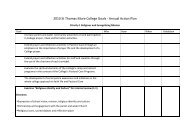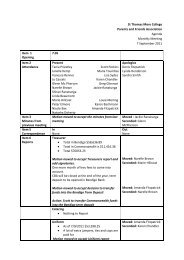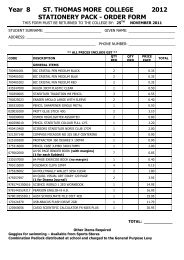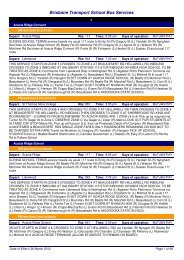School Renewal Action Plan - St Thomas More College
School Renewal Action Plan - St Thomas More College
School Renewal Action Plan - St Thomas More College
Create successful ePaper yourself
Turn your PDF publications into a flip-book with our unique Google optimized e-Paper software.
led to a narrowing of curriculum and a school system divided clearly between the winners and the losers<br />
based on standardized test results. Ultimately they provide stories for the media about the winners and the<br />
failures. However, while our reading, writing, grammar and numeracy scores do matter, they do not fully<br />
define what a complete education is, any more than a knife, fork and spoon constitute a dinner.<br />
So tonight on our night that is dedicated to recognising the achievements of our <strong>College</strong> and most<br />
importantly our students - let’s pause for a moment to consider what is truly important in education. What<br />
really matters once we strip away all the edu-babble associated with changes, standardised tests and<br />
outcomes?<br />
When we began our curriculum renewal at <strong>St</strong> <strong>Thomas</strong> <strong>More</strong> <strong>College</strong> we asked some big questions about the<br />
purpose of school. The goal of our curriculum review in 2010 was not simply about improving test scores or<br />
our outcomes data- Our changes were about delivering a curriculum which provided better pathways and<br />
opportunities for all students. What is the difference between the two?<br />
Well the difference between these two objectives is best told through a story – a true story based on an<br />
experience of an American businessman named Jamie Robert Vollmer. The story goes that he had been<br />
engaged to speak to a large assembled group of teachers and school leadership personnel around the<br />
issues of school organisation and performance. He commenced his address with the statement: "If I ran my<br />
business the way you people operate your schools, I wouldn't be in business very long!"<br />
You could imagine the reaction from the assembled audience. Vollmer represented a group of business<br />
people dedicated to improving schools. He was an executive at an ice cream company that had become<br />
famous in the 1980s when People magazine chose his company’s Blueberry Ice-cream the “Best Ice Cream<br />
in America.” Sounds to me like someone who is appropriately qualified to provide advice on how schools<br />
should be run.<br />
He was convinced of two things. First, schools needed to change; they were archaic and out of step with<br />
the needs of our emerging “knowledge society.” Second, teachers were a major part of the problem: they<br />
resisted change lacked the rigours of the corporate world and they had no idea about how competition<br />
leads to improvement. They needed to look to business about how to produce quality outcomes. Zero<br />
defects! A Continuous improvement agenda! In retrospect, the speech was perfectly balanced — equal<br />
parts ignorance and arrogance.<br />
As soon as he finished, a woman’s hand shot up. She appeared polite and pleasant. She was, in fact, a<br />
razor-edged, veteran - a high school English teacher who had been waiting to unload. (Sound like an English<br />
teacher you know?)<br />
She began quietly, “We are told, sir, that you manage a company that makes good ice cream.”<br />
He smugly replied, “Best ice cream in America, Ma’am.”<br />
“How nice,” she said. “Is it rich and smooth?”<br />
“Sixteen per cent butterfat,” he crowed.<br />
22


